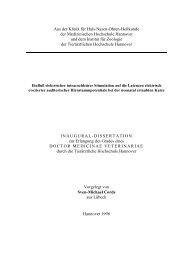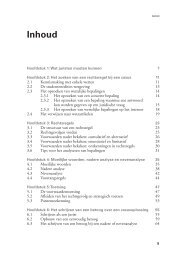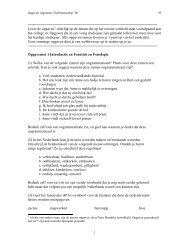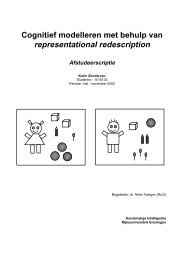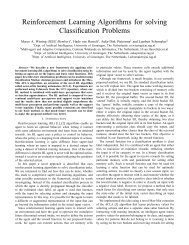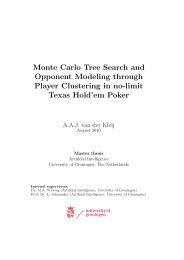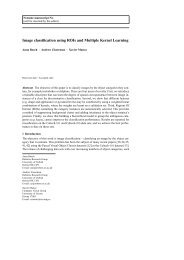Presuppositions in Spoken Discourse
Presuppositions in Spoken Discourse
Presuppositions in Spoken Discourse
Create successful ePaper yourself
Turn your PDF publications into a flip-book with our unique Google optimized e-Paper software.
Chapter 4<br />
Speaker B Really awful, I it was noth<strong>in</strong>g, it was noth<strong>in</strong>g, I said I didn‘t say anyth<strong>in</strong>g<br />
.<br />
Speaker c Oh God.<br />
Speaker B So anyway . by the time she‘d f<strong>in</strong>ished sort of tell<strong>in</strong>g me off and me<br />
say<strong>in</strong>g, now what‘s the good of quarrell<strong>in</strong>g, it‘s so trivial and…<br />
In the above example, an abstract object pronoun or even an ellipse could have<br />
been used, to read “by the time she’d f<strong>in</strong>ished that/ ∅” but the rhetorical effect<br />
would be lost, and the additional descriptive <strong>in</strong>formation that the presupposition<br />
contributes to the understand<strong>in</strong>g of the speakers perception of what the<br />
“harangue” really was would be lost.<br />
All of the presuppositional expressions of this type could be replaced with a<br />
pronom<strong>in</strong>al expression. This wouldn’t cause a loss of mean<strong>in</strong>g, but it would cause a<br />
loss of rhetorical effect. These examples the presupposed <strong>in</strong>formation can be<br />
replaced with an abstract object anaphor is because the predicated <strong>in</strong>formation<br />
about the antecedent is so similar to the predicated <strong>in</strong>formation about the triggered<br />
presupposition. This makes the relationship unambiguously identifiable, even when<br />
an anaphoric expression is used. But a pronom<strong>in</strong>al alternative cannot contribute<br />
rhetorical effects like presuppositions can.<br />
The examples <strong>in</strong> the follow<strong>in</strong>g section are different <strong>in</strong> that the<br />
presuppositional expression could not be replaced with a pronom<strong>in</strong>al anaphor.<br />
However, it still seems to be bound. In the first example the reactions of the other<br />
participants are taken as clues to b<strong>in</strong>d<strong>in</strong>g. In the second example understand<strong>in</strong>g a<br />
relationship is necessary for perceiv<strong>in</strong>g the discourse as coherent.<br />
4.3.3 Reactions by other participants po<strong>in</strong>t to the b<strong>in</strong>d<strong>in</strong>g relationship be<strong>in</strong>g<br />
perceived<br />
In the follow<strong>in</strong>g example the presupposed material does not express exactly the<br />
same semantic content as the potential antecedent, similar to the examples <strong>in</strong> the<br />
previous section. Because of this, it is not clear what the truth-conditional<br />
difference will be between a b<strong>in</strong>d<strong>in</strong>g resolution and a resolution via<br />
accommodation. But this example differs from the preced<strong>in</strong>g ones <strong>in</strong> that the<br />
presupposition cannot be replaced with a pronoun and part of the reason for this is<br />
that the potential antecedent is quite far from the trigger<strong>in</strong>g expression. The<br />
distance probably also contributes to the difficulty <strong>in</strong> perceiv<strong>in</strong>g what difference<br />
resolution by b<strong>in</strong>d<strong>in</strong>g and resolution by accommodation would make. F<strong>in</strong>ally, there<br />
was no clear rhetorical effect that encourages us to recognize a b<strong>in</strong>d<strong>in</strong>g<br />
relationship. However, there is evidence that the hearer did perceive a b<strong>in</strong>d<strong>in</strong>g<br />
relationship:<br />
(22) factive, triggered p: "He is enthusiastic (He = Prof. Pitt)" (2-1@ 120)<br />
Speaker A: Also Pitt has talked about it a good deal. Professor Pitt here, and he has<br />
supported. (a)<br />
(SEVERAL LINES) Yes, he has supported you (b)<br />
is it with the Cambridge Press.<br />
86



